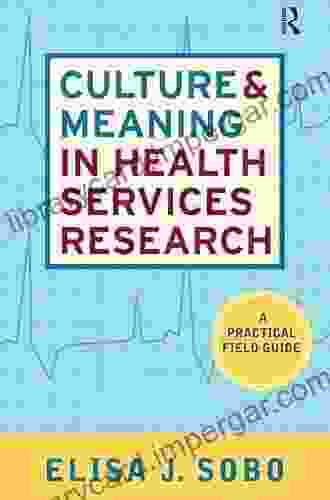Culture and Meaning in Health Services Research: Unlocking the Keys to Health Equity

5 out of 5
| Language | : | English |
| File size | : | 2357 KB |
| Text-to-Speech | : | Enabled |
| Screen Reader | : | Supported |
| Enhanced typesetting | : | Enabled |
| Word Wise | : | Enabled |
| Print length | : | 326 pages |
In the complex and ever-evolving realm of health services research, culture and meaning play pivotal roles that cannot be overlooked. Culture, the intricate web of beliefs, values, norms, and practices shared by a group, exerts a profound influence on health behaviors, healthcare experiences, and health outcomes. Meaning, the subjective interpretation and significance individuals attach to their experiences, further shapes their engagement with the healthcare system and their overall health journey.
Culture's Impact on Healthcare Disparities
Health disparities, persistent and unjust differences in health outcomes between different population groups, are often rooted in cultural factors. Cultural beliefs and practices can influence health-related behaviors, such as diet, exercise, and tobacco use, contributing to disparities in chronic diseases like obesity, heart disease, and diabetes. Cultural norms and values can also shape perceptions of illness, treatment preferences, and interactions with healthcare providers, leading to unequal access to care and lower quality of care.
Understanding the cultural context of health disparities is crucial for developing effective interventions and policies aimed at reducing these gaps. Researchers and healthcare professionals need to be equipped with cultural competence, the ability to effectively interact with and provide care to individuals from diverse cultural backgrounds.
The Role of Meaning in Patient-Centered Care
Meaning is a central component of the patient experience. The way patients interpret their illnesses and treatments, and the significance they attach to their health journeys, profoundly affects their engagement with healthcare and their overall well-being. Research has shown that patients who find meaning in their illnesses and treatments are more likely to adhere to treatment plans, experience better outcomes, and have improved quality of life.
Healthcare providers have a responsibility to acknowledge and understand the unique meanings that patients attach to their health experiences. By listening to patients' narratives, respecting their cultural beliefs and values, and incorporating their perspectives into treatment plans, providers can foster patient-centered care that promotes healing and empowerment.
Cultural Sensitivity in Research and Practice
Cultural sensitivity is essential in both health services research and clinical practice. Researchers must ensure that their research designs and data collection methods are culturally appropriate, avoiding bias and ensuring the inclusion of diverse populations. Healthcare providers must be equipped with the knowledge and skills to provide culturally competent care, respecting the cultural diversity of their patients and tailoring their interactions accordingly.
Training and education programs play a vital role in fostering cultural sensitivity. Researchers and healthcare professionals need to be trained in cultural competency, including an understanding of cultural diversity, communication skills, and strategies for reducing bias. By promoting cultural sensitivity, we can create a more equitable and patient-centered healthcare system.
Culture and meaning are inextricably linked to health and healthcare. By understanding the profound influence of culture on health behaviors, disparities, and patient experiences, and by incorporating meaning into patient-centered care, we can create a healthcare system that is equitable, responsive, and ultimately promotes the well-being of all individuals. The book "Culture and Meaning in Health Services Research" provides a comprehensive exploration of this important topic, offering valuable insights and practical guidance for researchers, healthcare providers, and policymakers.
5 out of 5
| Language | : | English |
| File size | : | 2357 KB |
| Text-to-Speech | : | Enabled |
| Screen Reader | : | Supported |
| Enhanced typesetting | : | Enabled |
| Word Wise | : | Enabled |
| Print length | : | 326 pages |
Do you want to contribute by writing guest posts on this blog?
Please contact us and send us a resume of previous articles that you have written.
 Book
Book Novel
Novel Page
Page Chapter
Chapter Text
Text Story
Story Genre
Genre Reader
Reader Library
Library Paperback
Paperback E-book
E-book Magazine
Magazine Newspaper
Newspaper Paragraph
Paragraph Sentence
Sentence Bookmark
Bookmark Shelf
Shelf Glossary
Glossary Bibliography
Bibliography Foreword
Foreword Preface
Preface Synopsis
Synopsis Annotation
Annotation Footnote
Footnote Manuscript
Manuscript Scroll
Scroll Codex
Codex Tome
Tome Bestseller
Bestseller Classics
Classics Library card
Library card Narrative
Narrative Biography
Biography Autobiography
Autobiography Memoir
Memoir Reference
Reference Encyclopedia
Encyclopedia Chris Woolf
Chris Woolf Robin Bennett
Robin Bennett Cher Threinen Pendarvis
Cher Threinen Pendarvis Sue Coletta
Sue Coletta Patricia B Mcconnell
Patricia B Mcconnell Ali Smith
Ali Smith Alfred E Hartemink
Alfred E Hartemink Alex Gregory
Alex Gregory Tony Vercoe
Tony Vercoe Alessandro Baruffi
Alessandro Baruffi Gotthold Ephraim Lessing
Gotthold Ephraim Lessing Altaf Masoodi
Altaf Masoodi Libby Gill
Libby Gill Amanda Brack
Amanda Brack Allan Webber
Allan Webber Alice Rose
Alice Rose Steven Bliss
Steven Bliss Tella Olayeri
Tella Olayeri Amalia Andrade
Amalia Andrade Jr Edwin H Sinclair
Jr Edwin H Sinclair
Light bulbAdvertise smarter! Our strategic ad space ensures maximum exposure. Reserve your spot today!

 Nathaniel HawthorneUnlocking the Secrets of Higher Education Leadership: A Comprehensive Guide...
Nathaniel HawthorneUnlocking the Secrets of Higher Education Leadership: A Comprehensive Guide...
 Marvin HayesThe True Adventures Of Gidon Lev: A Testament to the Unbreakable Human Spirit
Marvin HayesThe True Adventures Of Gidon Lev: A Testament to the Unbreakable Human Spirit Clayton HayesFollow ·19.1k
Clayton HayesFollow ·19.1k John GrishamFollow ·16.6k
John GrishamFollow ·16.6k José SaramagoFollow ·9.9k
José SaramagoFollow ·9.9k Hank MitchellFollow ·13.8k
Hank MitchellFollow ·13.8k Israel BellFollow ·14.8k
Israel BellFollow ·14.8k Leon FosterFollow ·16.9k
Leon FosterFollow ·16.9k Roland HayesFollow ·19.7k
Roland HayesFollow ·19.7k George MartinFollow ·12.9k
George MartinFollow ·12.9k

 Ignacio Hayes
Ignacio HayesUnveiling the Secret Spitfires: Britain's Hidden Civilian...
: The Untold Story of Britain's...

 Scott Parker
Scott ParkerLiving With Schizophrenia: A Father and Son's Journey
Schizophrenia is a serious...

 Ted Simmons
Ted Simmons"From Sign Up to Pass Out": The Shocking and Immersive...
Step into the...

 John Keats
John KeatsThe Development of Biographies and Philosophical...
The Alluring...

 Dan Brown
Dan BrownCapture Your Dream Wedding with Digital Wedding...
Your wedding day is...
5 out of 5
| Language | : | English |
| File size | : | 2357 KB |
| Text-to-Speech | : | Enabled |
| Screen Reader | : | Supported |
| Enhanced typesetting | : | Enabled |
| Word Wise | : | Enabled |
| Print length | : | 326 pages |










